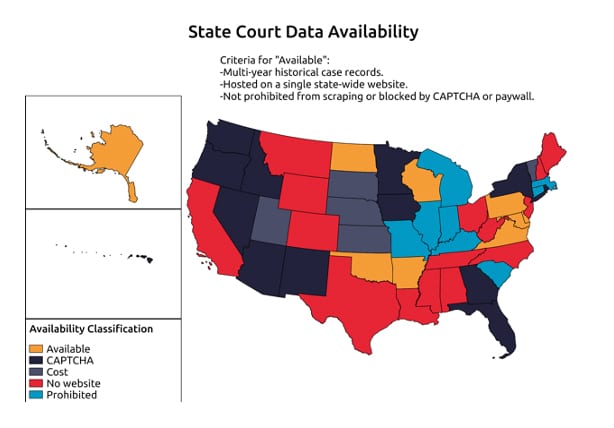Legal data, from court cases to legislative materials, form the framework of our justice system, and automation and artificial intelligence are the tools that make legal data accessible, organized and useful for all.
This is the third article in a three-part series on the what, how and why of open legal data. In Part I, we discussed what open data is and how it can improve access to justice while strengthening attorneys’ practices. Then, Part II delved into the how of legal data and what it takes to make bulk access to structured data possible through automation and AI. To round out this discussion, we now turn to the who and, ultimately, the why of open legal data.
We’ll look at the key players furthering the spirit of the Supreme Court’s ruling in Georgia v. Public.Resource.Org (a landmark decision prohibiting states from copyrighting the law) — and how their work practically affects lawyers and their clients. Surveying the open data landscape, we see the recent wins in this sphere translate to concrete benefits for practitioners, from those in BigLaw to solo practices.
When It Comes to the Law, There Should Be No Second-Class Citizens
Carl Malamud, president of Public.Resource.Org and a leading champion of the movement promoting open legal data, set the open access fight in motion. His 2019 win in Code Revision Commission v. Public.Resource.Org was a substantial victory for the movement: The 11th Circuit deemed the annotations to the Georgia statutory code public domain materials that were not copyrightable, against the state’s wishes to hide the official law behind a prohibitive paywall.
Responding to Georgia’s petition for certiorari, SCOTUS recently ruled in favor of Public.Resource, marking a watershed moment for open law advocates and the greater access to justice movement. By denying a state’s right to effectively “own” the law, the high court affirmed that everyone, from lawyers to the lay public, should have unfettered access to the laws that bind them. As such, the court established that access to the law is no longer a privilege reserved for the upper echelons of the legal community and those who can afford restrictive “pay-per-law services.”
This win notwithstanding, open law advocates have their work cut out for them. Even though states can no longer own the law, substantial barriers persist. Fortunately, open law advocates continue working to remove these barriers to make SCOTUS’ ruling more than just a theoretical statement that legal data belongs to all.
Open Data Advocates Removing Barriers to Legal Information
Front-line advocates like Carl Malamud are essential to the open data movement. They are fighting to remove technical and financial barriers so that the law is truly accessible to everyone, not just “first-class” readers able to overcome technical challenges or afford costly paywalls. While the number of open data advocates in the legal sphere continues to grow, here are a few key players to watch closely.
The Legal Services Corporation
To improve access to the law and advocate for policy changes, the Legal Services Corporation has conducted key research on the openness of legal data (or lack thereof) throughout the United States. Consider, for example, the below chart, revealing an astonishing lack of open access to data in state court systems, as well as the technical and financial barriers obscuring access for LSC and legal tech companies seeking to introduce innovation in the profession. This is one example of how LSC and Chief Data Officer Carlos Manjarrez are working to bring transparency to inequities in the availability of legal data for lawyers, legal professionals, and the public.
The Caselaw Access Project
An initiative of the Harvard Law School Library Innovation Lab, spearheaded by Adam Ziegler, the Caselaw Access Project affords access to 6.5 million opinions from state and federal courts. The project sets an important precedent through which similar types of data could become broadly available to the public.
The Free Law Project
A fixture in the open legal data movement, the Free Law Project is a nonprofit led by Michael Lissner that leverages a variety of initiatives to make access, study and use of the law easier and more efficient for consumers. Free Law mainly does this by collecting legal information and packaging it in searchable archives that are made publicly available.
National Science Foundation-Funded Initiatives
The National Science Foundation recently funded two interdisciplinary projects designed to enhance the public’s understanding of how citizens interact with the justice system and improve access to legal data. One of those projects, the Georgetown Data Commons, is investigating the incentives and concerns of stakeholders in the civil justice system and working to create a “data commons” to share legal data publicly for research and analysis. The other project is Northwestern Law’s Open Access to Court Records Initiative, which will use grant money to download PACER dockets and construct a searchable platform built for researching and developing forward-thinking public policies. These projects collectively increase the availability and transparency of elusive (and expensive) federal court data.
The PACER Collective
In 2018, UniCourt and Justia established the PACER Collective to improve access to federal court data through a cost-sharing partnership. Since both organizations publish federal court records online free to the public, we joined forces to share costs rather than pay separately for the same expensive data from PACER. This way, we both get more regularly updated data that we can then share with the public.
Since its inception, we have added new partners to the PACER Collective and welcome others to join.
How This Affects You, the Practicing Lawyer
Open legal data and the continued push for increased access mean two things for practicing lawyers. First, the costs to access the legal data that you need to run your practice will continue to decrease. Second, continued progress in legal innovation will make your practice run more profitably and efficiently.
As the Supreme Court established in Public.Resource, no one should be able to copyright the law. However, this principle alone is not enough to increase access to justice. Paywall barriers persist in barring access to the corpus of legal information. As such, one of the open data movement’s most significant impacts so far is its ongoing fight to reduce the costs of access to legal information. This is especially good news for small firms and solo attorneys.
Further, with legal data fueling innovation, one of the most important accomplishments of the open legal data movement is that increasing access to information also significantly reduces barriers to entry for legal tech companies and other innovators in the legal industry. Lawyers benefit directly from these innovations, whether through smarter research applications, more efficient contract review or data entry tools, or process automation that irons out administrative inefficiencies.
We’ve Come a Long Way, but There Is Work Yet to Be Done
Thanks to open law champions like Public.Resource, LSC and others, the access to justice landscape looks promising. Nonetheless, until both state and federal courts as well as legislatures allow unfettered access to legal information, advocates within the open legal data movement face the daunting challenge of building more bridges than walls.
Fortunately for lawyers everywhere, we accept the challenge.
Illustration ©iStockPhoto.com
Subscribe to Attorney at Work
Get really good ideas every day for your law practice: Subscribe to the Daily Dispatch (it’s free). Follow us on Twitter @attnyatwork.


















